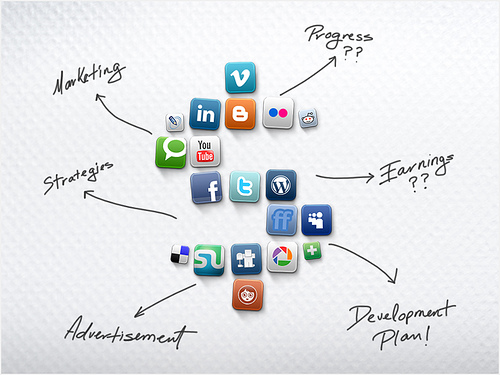Every organization must engage in some level of marketing to attract a steady flow of customers and revenue. Marketing is both an art and a science, made more complex depending on the industry and target audience. How do owners and executives decide whether to keep marketing activities in-house, or outsource to a reputable agency or freelancer?
Budgeting Concerns

Image via Flickr by Rosaura Ochoa
For most businesses, the key issue in marketing decisions is budgeting and cost control. At minimum, a functional marketing team includes an SEO expert, a designer/developer, a copywriter, and an analytics professional. In many cases, the team is overseen by a marketing director. With salaries, benefits, and overhead, adding a marketing team can easily cost several hundred thousand dollars per year. For many small to medium sized businesses, bringing expertise in-house is simply out of range.
Of course, initial outlays for an outsourced marketing agency are also substantial; however, these are often more controllable. Marketing activities can be scaled up or down depending on the needs of the business.
Loss of Control
Losing control of the process is a major drawback to outsourcing for many marketing executives. In many cases, once the scope of work and schedule of deliverables are agreed upon, the client has little say over the process. Some agencies will negotiate to allow clients a greater level of editorial control, but for the most part, the agency handles the execution of all campaigns.
The advantages to the client include access to a high level of proficiency and expertise, as well as cutting-edge technology, that they could not realistically afford on a full-time, internal basis. In addition, the client has a reasonable expectation of results based on the agency’s past performance with other clients.
However, when marketing is outsourced, it is more difficult to integrate marketing activities with the business activities of other departments within the organization, which is a distinct disadvantage in certain cases.
A Hybrid Approach
Many organizations find a hybrid approach to be the most attractive option. Hiring a marketing director and web designer/developer to design and implement overall marketing strategies and campaigns keeps the decision-making and control in-house; outsourcing elements such as copywriting, content creation, and SEO maximizes the impact and extent of the marketing budget and gives the organization access to a higher level of talent and expertise.
For Employees
Individuals pursuing a career in marketing are often faced with the choice of taking an in-house position with a business or working with an agency. There are advantages and disadvantages to each option. In-house marketing positions generally have a higher level of job security and allow individuals to develop in-depth competencies in their industry niche and target audience.
For many marketers, however, agency work offers more variety and a higher level of creative freedom. Agencies expose individuals to different campaigns and clients, allowing them to develop a diverse skill set across a variety of industries.
In-house marketing and outsourcing each have unique advantages and disadvantages for the business executive and marketing professional. In the end, the decision rests on budget and the level of expertise necessary to achieve your marketing goals.
